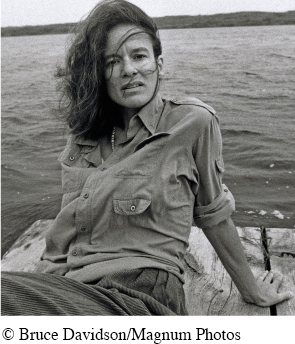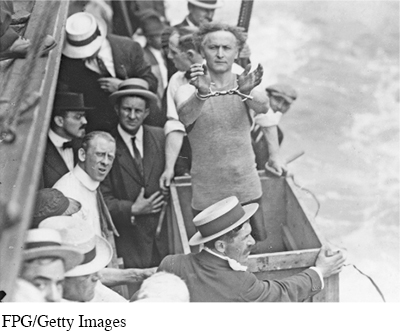5.6
My Son the Man and The Possessive
Sharon Olds

Born in San Francisco in 1942, Sharon Olds has become one of America’s most well-
Olds My Son the Man
Suddenly his shoulders get a lot wider,
the way Houdini would expand his body
while people were putting him in chains. It seems
no time since I would help him put on his sleeper,
5 guide his calves into the shadowy interior,
zip him up and toss him up and
catch his weight. I cannot imagine him
no longer a child, and I know I must get ready,
get over my fear of men now my son
10 is going to be one. This was not
what I had in mind when he pressed up through me like a
sealed trunk through the ice of the Hudson,
snapped the padlock, unsnaked the chains,
appeared in my arms. Now he looks at me
15 the way Houdini studied a box
to learn the way out, then smiled and let himself be manacled.


This is Harry Houdini, the magician, just before he is sealed into a trunk and dumped into the Hudson River, in a famous illusion that becomes an extended metaphor in “My Son the Man.”
Understanding and Interpreting
Describe the speaker of this poem. What concerns her? What scares her? Be sure to use evidence from the text to support your response.
This poem makes use of a literary device known as a “conceit” or an “extended metaphor,” in which an author repeats a comparison multiple times throughout a text. In this case, the speaker makes three separate comparisons between her son and the famous magician Harry Houdini. For each of the following lines from the poem, explain how the reference to Houdini reveals a different aspect of the relationship between the speaker and her son:
“his shoulders get a lot wider / the way Houdini would expand his body / while people were putting him in chains. . . .” (ll. 1–
3) “when he pressed up through me like a / sealed trunk through the ice of the Hudson, / snapped the padlock, unsnaked the chains, / appeared in my arms. . . .” (ll. 11–
14) “he looks at me / the way Houdini studied a box / to learn the way out. . . .” (ll. 14–
16)
Now that you have explored the individual parts of the extended Houdini metaphor, explain the overall purpose of the comparison. What is Sharon Olds saying about the relationships between mothers and sons by using the multiple comparisons to Houdini?
The speaker admits that “[t]his was not what she had in mind” when confronted by the inevitable maturation of her son into a man. In what ways is the speaker’s concern specifically about gender, and in what ways is it about watching a child grow up?
The final lines of the poem bring the situation into the present, as the son looks at his mother and smiles like Houdini does before he lets “himself be manacled” (l. 16). From the point of view of the speaker, is this a sinister or a playful smile, or something else?
Analyzing Language, Style, and Structure
The poem begins with the word “suddenly” in describing how the speaker’s son’s shoulders seem to expand quickly. How does the use of this opening signal the way that time will be presented in this poem? Explain the possible implications of the speaker’s sense of time.
Explain how the imagery in lines 3–
7 establishes the relationship between the mother and her son. The speaker claims that she must get over her “fear of men” (l. 9). How does she communicate this fear throughout this poem?
In lines 7–
8, the speaker admits, “I cannot imagine him / no longer a child.” Discuss how this description, which contrasts with the title of the poem, reveals a central struggle that the speaker is experiencing.
Connecting, Arguing, and Extending
How much different would this poem be if the speaker were a father instead of a mother? What would the father likely focus on that the mother does not? Why? Think of an extended metaphor that could be used by the father to illustrate the fear he might have in watching his son grow up and explain why you think this would be an effective comparison.
In what ways has your relationship to a parent, guardian, or older friend or sibling been similar to or different from the relationship Olds describes in this poem? What do you think that the older person has struggled with as you have grown older yourself?
One reviewer for the New York Times said of Sharon Olds, “She has made the minutiae of a woman’s everyday life as valid a subject for poetry as the grand abstract themes that have preoccupied other poets.” Do you agree or disagree with the reviewer, and why?